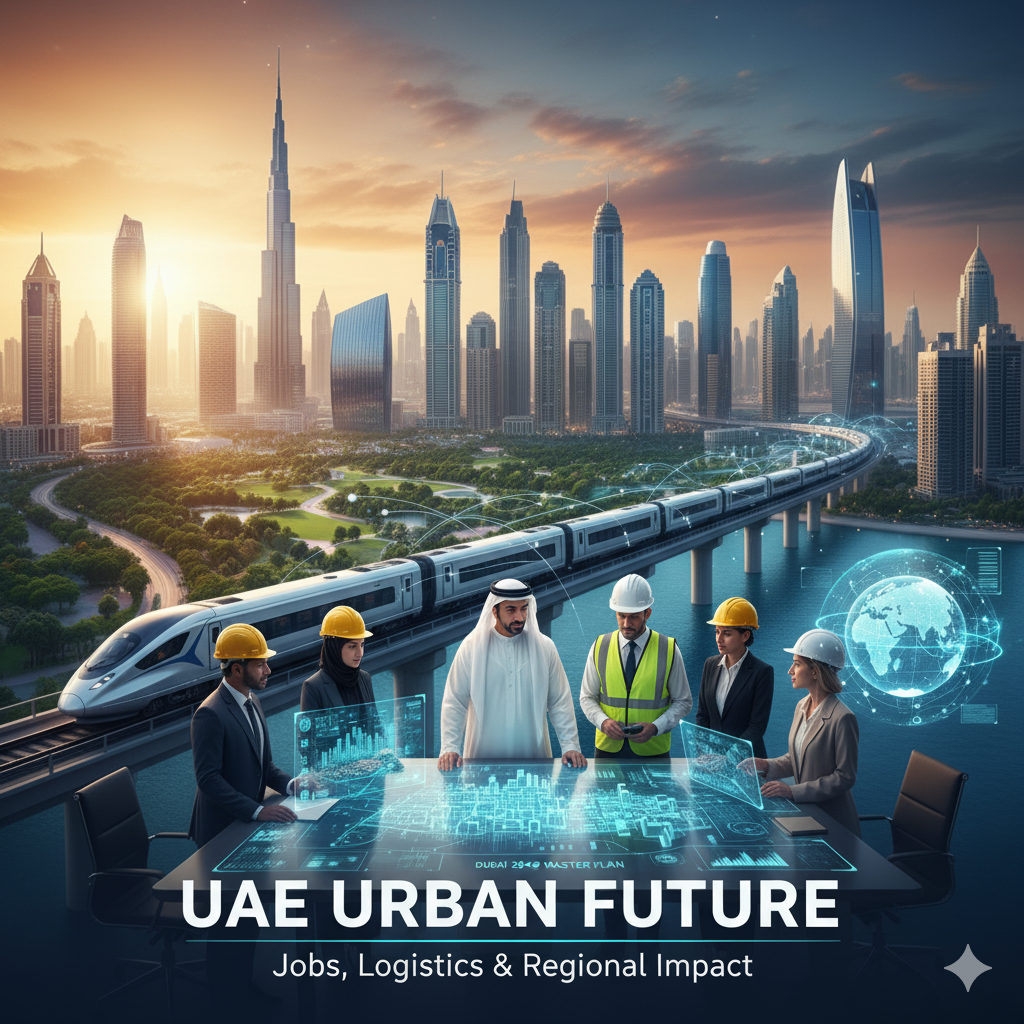Dubai 2040 Urban Master Plan: A Blueprint for the Future of Work & Urban Life
The UAE’s Urban 2040 Master Plan is more than a blueprint for buildings and green space — it’s a roadmap for transforming how people live, work, and how goods move. As Dubai and other emirates evolve, logistics, cargo, and transportation industries are at a tipping point. Urban infrastructure, sustainability goals, and mobility changes will create profound effects for jobs, business opportunities, and regional supply chains.
This blog explores:
-
What the Urban 2040 plan aims to achieve
-
The jobs and business opportunities it will unveil
-
How GCC neighbouring countries are impacted
-
How logistics, cargo, and freight forwarding industries stand to benefit
What Is the Dubai 2040 Urban Master Plan?
According to the UAE government, the plan has these high-level goals:
-
Upgrade urban areas and ensure new growth is sustainable and inclusive.
-
Improve resource utilization (land, mobility, energy).
-
Double green and leisure areas; enhance walkability, cycling, and sustainable mobility.
-
Ensure people live closer to transit: more public transport coverage, integrated mobility.
For example, the plan seeks that by 2040 at least 55% of residents in Dubai live within 800 meters of a major public transit station.
Jobs & Business Opportunities in the UAE under 2040
Urban transformation on this scale always creates demand. Here are key employment and entrepreneurial opportunities:
Employment Opportunities
-
Transit-Oriented Development (TOD) Specialists
Urban planners, architects, civil engineers skilled in TOD, mixed-use developments, and public-transport-oriented design. -
Public Transport & Mobility Workforce
More metro lines, expanded bus networks, last-mile delivery services, EV/e-bike operators. -
Green Infrastructure & Sustainability Roles
Experts in green building, renewable energy integration, carbon-monitoring, ESG compliance. -
Smart Logistics & Cargo Handling Jobs
Roles in cargo planning, urban warehousing, multimodal logistics (rail + road + sea), digital tracking, cold chain specialists. -
Tech + Data Analysts
Demand for data scientists, AI/ML engineers, GIS analysts to manage big data on traffic flows, urban mobility, and resource usage. -
Regulatory & Governance Experts
Professionals to help align with new policies, safety standards, mobility regulation, environment laws.
Business & Investment Opportunities
-
Urban Warehousing & Micro Fulfillment
Warehouses placed near urban centres to support e-commerce, quick delivery, and reduced last-mile costs. -
EV & Sustainable Delivery Services
Green fleets for last-mile delivery, electric bikes/scooters, and perhaps driverless delivery pilots—as in Masdar city. -
Transit-Hub Integrated Logistics Parks
Logistics parks around metro stations, around rail stations, or close to ports + airports for multimodal freight. -
Mobility Tech Startups
Apps for route optimization, traffic prediction, delivery scheduling, and combining soft mobility with cargo. -
Green Infrastructure and ESG-Compliant Services
Suppliers/contractors for charging stations, green building materials, sustainable packaging, energy-efficient warehouses. -
Urban Transport & Mobility Infrastructure
Investment in metro lines, public transport, cycling/walking infrastructure; these require contractors, operators, and service providers.
GCC-Wide Impacts
Though the plan is UAE-specific, its effects ripple across the Gulf:
-
Trade Corridors Strengthened: Projects like Etihad Rail and regional logistics zones gain relevance, improving cross-border freight flows.
-
Benchmarking and Policy Spillover: Other Gulf countries will look to Dubai’s approach as a model—regulatory reforms, TOD, green mobility, urban logistics.
-
Supply Chain Hub Competition: The Gulf will see sharper competition among cities and ports to attract investment (logistics zones, free zones) to serve growing demand.
How Logistics & Cargo Industry Will Benefit
-
Reduced Transit Times & Congestion
With better integrated transport systems (metro, rail, roads), urban congestion will drop. Logistics companies can better predict delivery times and lower fuel/operational costs. -
More Warehouse Demand Near Cities
Urban densification demands last-mile storage and micro-fulfillment centres. Firms that position assets near transit hubs will benefit. -
Multimodal Freight Solutions
With urban rail and public transport expansion, combined with ports, airports and road networks, there’s room for sea-rail-road integrated logistics in the Gulf. -
Sustainability as Value Add
Green delivery, emissions reduction, and energy efficiency will help logistics companies meet ESG requirements and appeal to customers sensitive to carbon footprint. -
Digital & Automated Logistics
Real-time tracking, AI for routing, blockchain for freight documentation, and automation in warehousing are all enabled by planned infrastructure and regulatory support.
Challenges to Watch
-
Upfront investment costs (for developers, operators) can be high.
-
Regulatory alignment across emirates and GCC may lag.
-
Talent shortage for specialized roles (EV fleet maintenance, AI, TOD planning).
-
Urban design vs cargo flow conflicts (some areas may restrict heavy trucks or delivery times).
Action Points for Logistics and Freight Forwarding Stakeholders
-
Map your operations to new transit corridors and planned hubs to anticipate demand.
-
Invest in green fleet and last-mile infrastructure to align with mobility plans.
-
Explore partnerships with free zones, urban developers, public authorities.
-
Build skills internally (data, automation, ESG compliance).
Conclusion
The UAE Urban 2040 Master Plan is shaping a future where livability, mobility, and logistics converge. For businesses in logistics, freight forwarding, cargo handling, this is an inflection point. Jobs, business models, supply chains are evolving. Those who adapt early will set the standards for GCC’s new urban era.

